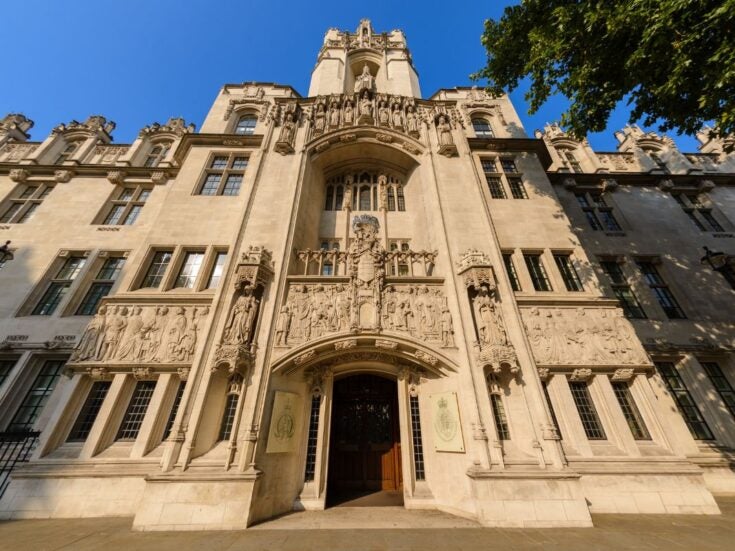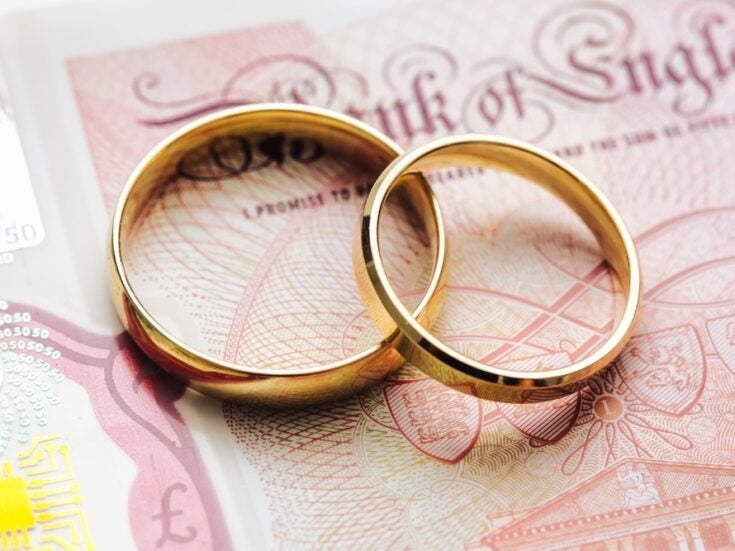
BLACK AND BLUE AND GOLD
‘What you’re seeking is the nurturing and the love following the violence. If you’re willing to sit through that you get so much love and care and attention’
Sara has only ever spoken to two people about the abuse she suffered during her first marriage: the two friends who helped her escape. Whatever stereotypes you might entertain of an abused wife, she probably doesn’t fit them: she’s highly educated, an investment banker, from a wealthy, international family and, when she tells me her story I’m struck by her composure, the reflective but unemotional way in which she describes the steadily mounting violence concealed within her family home.
Recent events have seen the traditional image of the victim of domestic violence cracked open. The photos of Charles Saatchi gripping his wife Nigella Lawson by the throat during what the advertising mogul later described as a ‘playful tiff’ put the subject front and centre, while the public way he told her he wanted a divorce — on the front page of the Mail on Sunday — can easily be seen as a form of emotional abuse. Saatchi accepted a caution for assault after the pictures were made public.
According to the domestic violence charity Women’s Aid, one in four women in the UK experience domestic violence (whether physical, verbal or emotional) — and no one is immune. ‘We get women from across the social spectrum reaching out to us,’ says Franki Hackett, media officer at Women’s Aid.

Illustration by Kotryna Abromaityte
Domestic violence isn’t just between spouses either: when a lawyer I know revealed bruises inflicted on her by her father, her response to my shock was that this kind of violence at home is ‘normal’ and ‘not a big deal’.
Eyes averted
I couldn’t find any statistics on whether domestic violence is as common in mansions as in council estates across the country, but there is plenty of evidence of it among the UK’s wealthiest families. Dr William Shanahan, executive medical director at Capio Nightingale, a private clinic that specialises in treating wealthy clients with addiction problems, estimates that his practice sees at least one case involving domestic violence a week but concedes it could be higher — because ‘we may not look for it enough’.
‘It’s only when people realise they can’t get on with their lives that they will let us get involved,’ he adds. ‘I think you get a little bit of collusion going on sometimes with people who are well off, where nobody wants to rock the boat, so people don’t get involved early enough. But my goodness, when it breaks out it’s pretty violent. One violent incident is pretty much the same as the next when it comes to people having a go at one another. The same objects fly, the same punches fly and the same pain is experienced.’
As well as these similarities, there are striking differences in how the wealthy experience domestic violence — independent financial means can sometimes empower individuals to leave abusive relationships, but often there are unique pressures, too, from the stress of concealing private pain behind a public profile to the ill-informed assumptions made by police, social services and the general public about the rich who don’t, or can’t, escape their situation.
Watch: Editor Josh Spero on domestic violence among the wealthy
Unusually, there may be witnesses to domestic violence among the wealthy. Sara’s abuse was hidden behind closed doors, but in full view of domestic staff — who were asked to spy on her and ensure she obeyed her husband’s orders on where she could go and who she could meet. Although she says they ‘cut me a bit of slack’ when they realised what was happening, when I ask if they would have intervened had they ever thought she was going to be seriously injured, there’s a long pause. ‘I would have thought they wouldn’t. He used to throw stuff a lot, so there was one time when he woke up a couple of the staff and they came in. He told them to go out and they went away. I don’t know if they used to stay around to listen.’
A second difference is that high-flying women don’t easily fit the caricature of the ‘pathetic victim’ of domestic violence. Franki Hackett argues that the idea that women suffering from domestic violence are necessarily pathetic victims is damaging and makes it harder for high-flying women like Lawson to speak out. ‘Sometimes people who are experiencing domestic abuse hide it incredibly well, and seem very outgoing and successful on the outside, and this can make it even harder for these women to reach out to their friends and family and say, “This is happening to me.” It seems like there’s even more shame, the feeling that it shouldn’t happen to people like them.’
Public shame
Women from wealthy or prominent families may also fear the publicity that comes with exposing domestic violence. Although Sara says one reason she kept her abusive family life secret is because she’s a ‘private person’, she also believes her circumstances conspired to make it harder to speak out. As both she and her husband are from high-profile families, she feared a public scandal. ‘I didn’t really want to cause trouble, or trouble between the families… My family is scandalous enough without this sort of thing coming out,’ she says with a dry laugh.

The same misconceptions that make it hard for them to speak out can also mean that police and social services treat wealthy survivors of domestic abuse differently. ‘Sometimes it will play out that someone who is wealthy or who has a higher level of social standing, shall we say, can get extra help from the police, because the police are less likely to see them as a problem in themselves. But at other times it can make it harder, because they can say, “Well, she’s got enough money,” or “She doesn’t look like the typical victim of domestic violence,”’ Hackett explains.
Read more: Retail heir’s assault on wife exposes the reality of domestic violence and the wealthy
It’s not only the police who may treat the rich differently. Echoing Dr Shanahan’s suggestion that outsiders don’t want to ‘rock the boat’ when it comes to the rich, a private-school teacher confided in me her concern that her school is reluctant to contact social services when they suspect a pupil may be neglected or abused at home, preferring to handle matters in-house to avoid negative publicity or alienating fee-paying parents. Having spoken privately to a social-services worker, she fears this is placing children at risk.
I wondered whether private hospitals might sometimes take a similar attitude — patients are paying high fees for privacy and discretion after all, which might make clinics hesitant to involve outsiders. Moreover, as Dr Shanahan points out, in clinics like Capio Nightingale specialising in addiction, the patients may well be the perpetrators.
Dr Shanahan is quick to refute my suggestion, however, saying: ‘We all have duties of care to people, whoever they are. As doctors and carers, we’re not going to sit by because someone is paying a bill and ignore obvious violence if the patient is the perpetrator. We’re not going to let that happen.’
Controlling interest
What appears to be the significant difference between wealthy and not wealthy victims of domestic violence — money — may in fact be a similarity: neither may have control over their own finances, something that exasperated onlookers, bemoaning why she doesn’t just leave, often don’t see.

‘Abuse is really about control, it’s not just about hitting or that kind of thing,’ says Hackett. ‘A big way that perpetrators control their victims is through financial abuse. So something that we might see frequently is a woman who is part of a wealthy family who doesn’t necessarily have independent means because she’s being financially controlled by her partner. And that can make things really quite difficult — particularly in a divorce situation, where it’s very stressful. We know that when a woman tries to leave, that is the most dangerous time for her, as that is a time when perpetrators regularly attempt to seize greater control because they know they are losing it. That can be a real financial struggle for women who appear to be wealthy, or are part of a wealthy family.’
Nevertheless, the myth that wealthy women can afford to leave is an enduring one. Sara was fortunate enough that her job as a banker meant she could leave without risking homelessness or pennilessness. When she filed for divorce, she didn’t make any financial claim against her husband. ‘When we divorced I didn’t want any of his money so I just agreed to nothing, I didn’t want anything to do with him ever again,’ she explains.
Read more: Elizabeth Taylor, Rihanna, Nigella Lawson — Exposing Domestic Violence in Wealthy Homes
Richard Collins, a partner at Charles Russell specialising in HNW divorce cases, says it’s not unusual for women leaving their partners to want nothing, and he sees his role as gently discouraging them: ‘Sometimes people do instruct you saying they just want to leave with nothing, but you’re dealing with people in a crisis, and your job is to point out what they are legally entitled to and to test the reason why they wish to accept less than their entitlement.’ At times women whose self-esteem has been eroded by systematic abuse don’t feel able to make a financial claim, but any settlement, however rejected at the time, may be able to offer financial freedom, or at least security, after a divorce.
Wealthy women may have the advantage of expensive legal representation in divorce courts, but domestic violence isn’t necessarily taken into account during proceedings unless it is so serious that it reduces earning capacity — a fairly macabre criterion. Otherwise, the extent to which abuse is reflected in final divorce outcomes can vary. ‘It’s a discretionary forum, and if the judge takes against someone then that may affect the final outcome, but if it’s a one-off incident and there’s no lasting harm then it’s not usually considered,’ Collins explains.
Love, Actually
Whether rich or poor, however, financial considerations alone rarely explain why men or women stay in or leave abusive relationships. Did you love your husband, I ask Sara. While usually she takes a while to answer, carefully formulating a response, this time she replies instantly. ‘Completely. It’s bizarre, isn’t it?
‘I think because what you’re seeking is the nurturing and the love following [the violence]. If you’re willing to sit through that you get so much love and care and attention. You feel like a million dollars. He whisks you away and sends you flowers every day in the office. It’s almost like you take that because you know how good it is when they want to make it up to you, I suppose. It was a very different kind of love from the love I know now, it was very naïve and that was a very insecure part of life. But it’s love nonetheless.’
And perhaps this, above all, is the hardest for outsiders to comprehend. ‘It’s an interesting feature of the human psyche that some people don’t want to walk away,’ Sara says. ‘There’s always a certain amount of tolerance [to domestic violence], so I think it will always happen. People do funny things for love, right?
Sara is not the interviewee’s real name
Read more on domestic violence from Spear’s
Read responses to this article
Don’t miss out on the best of Spear’s articles – sign up to the Spear’s weekly newsletter
[related_companies]






